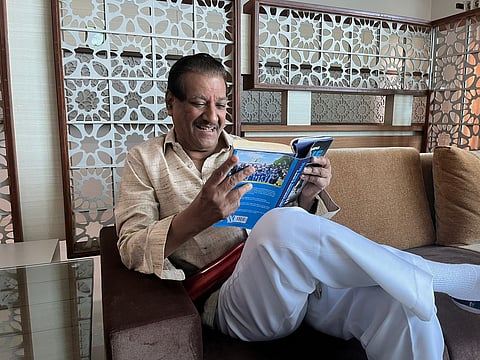

CHENNAI: The ninth edition of the Women's T20 World Cup is only 24 hours away. A cricket bonanza where multiple matches will be played under lights, where every play will be analysed and every moment will be captured by a multi-camera setup. Social media will get involved and the extraordinary athleticism of the elite cricketers will undoubtedly get viral. That is how far the women's game has come now.
However, this was not always the reality for women's cricket anywhere in the world. Certainly not in India. And that is where the pioneers of the women's game and those who stood behind the players become an integral part of this story. "The attitude of society towards women's cricket was not that positive when we started. There were so many doubts about our abilities," Ujjwala Nikam-Pawar, one of the first ladies of women's cricket in India, told this daily. "We started at the Engineering College ground in Pune. Our then-MP Sambhajirao Kakade and his wife, Kanthavati, inaugurated the training facility. Mrs. Kakade even went to the homes of some of the players who were not allowed to play cricket by their families and convinced their parents to send their daughters for practice. In those early days, she also worked as our manager," Nikam-Pawar remembers.
The systemic change happened when Premala Chavan, or Kaki as she was affectionately known, was approached by Narendra Nikam to be the president of the Maharashtra Ladies Cricket Association. "When Narendra Nikam and everyone else came up with the idea, they proposed that my mother should be the president of the organisation because she was a Member of the Parliament at that time," Prithviraj Chavan, son of Premala Chavan and current Member of Maharashtra Legislative Assembly told this daily.
"At that time, women's cricket was such a new topic that people would not believe it if we told the details. The players did not have money to travel, she would give them money for that. Whenever they used to come to Delhi, I remember, they never stayed at a hotel or any such place. They used to stay at our home and even have meals there. Diana Edulji, Chandrika Kenia, and Shubhangi Kulkarni have stayed at our home," he added.
For someone who grew up around cricket in Indore, it was natural for her to form a love for the game. "She was always surrounded by cricket. Her sister's husband, Captain BB Nimbalkar (Bhausaheb Babasaheb). He represented Maharashtra in Ranji Trophy and ws remembered for his innings of 443 not out in the 1948–49 Ranji Trophy match between Maharashtra and Kathiawar. Her elder brother was MM Jagdale from Indore. The Jagdale family was into cricket with Holkars from the beginning. He was a key Holkar Cricket team member, including legends like CK Nayudu and Mushtaq Ali. Later he became the national selector. Both his sons, Sanjay and Ashok, also played. The family was always surrounded by cricket. The talks over the dinner table always used to be around cricket."
"So when the opportunity came to contribute something to women's cricket, she immediately took it. We didn't take it seriously at that time, but my mother persisted. She used to say, we must give opportunities to the players. And she believed in that. She played the role of anchor in those times," the former Chief Minister of Maharashtra revealed.
Nikam-Pawar echoed the sentiments. Once she took over as the president of the national body — Women's Cricket Association of India the help grew multifold. "Premala Kaki was always behind us like a rock. The only way I can describe her is 'Simple living, high-thinking'. She didn't have a 'no' word in her dictionary. We could ask for anything and she would never say no to it. The Chavan family had close relations with the Gandhi family. Even when Premila Kaki used to go to meet them, Rajiv ji would stand up saying "Please come, Kaki". I remember it. So we kept getting that support and later hosted the Nationals in 1973 in Pune," she added.
Even after playing a crucial role in the foundation of women's cricket in the country, Prithviraj Chavan believes his mother played a supporting role and the players who actually took the ground are the real heroes of the story. "The players are the real pioneers. They started it all and that's why we are here today. My mother played a supporting role when needed."
Nikam Pawar put it the best way. "What you see today is a strong tree. And it is strong because those seeds were sown by previous generations and the support we got from people like Premala Kaki."